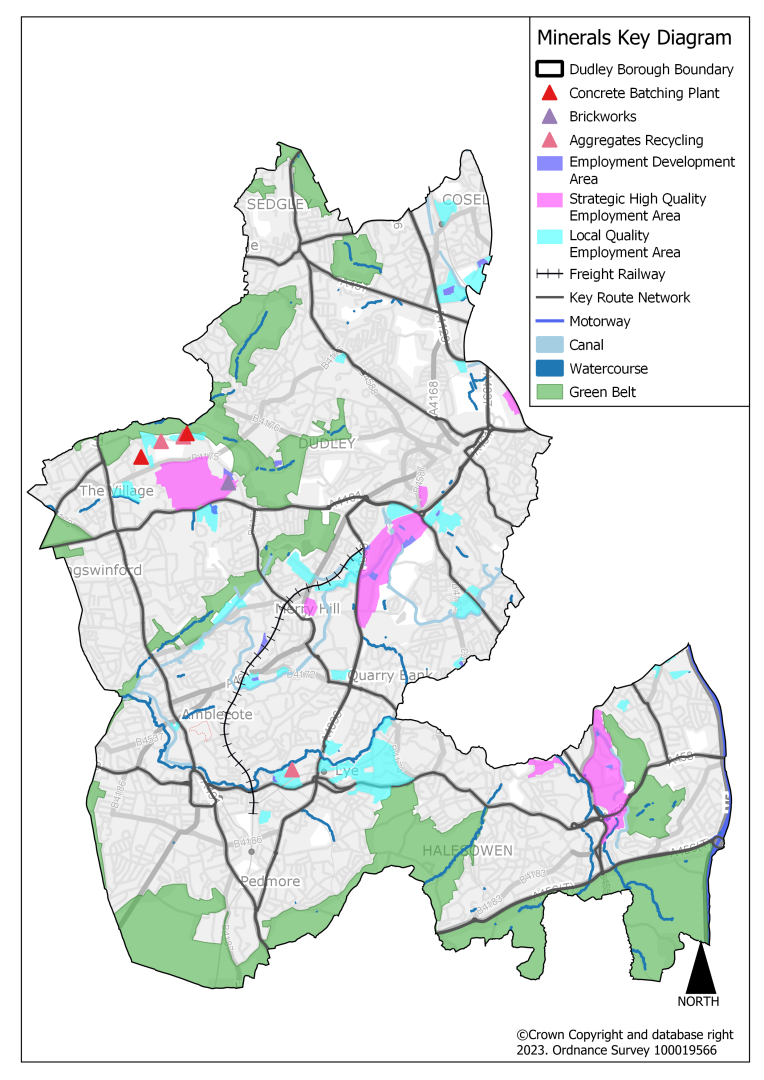Part One: Spatial Strategy and Policies (Regulation 18)
18. Minerals
Introduction
18.1 Local plans are expected to make sufficient provision for all kinds of development, including for minerals (NPPF). The policies for minerals support the strategic objectives of the Plan.
Spatial Strategy Plan: Minerals
Minerals Production - Requirements
18.2 This policy reflects the fact that there are no remaining workable primary minerals reserves within Dudley Borough (as identified in the supporting Black Country and Dudley Borough Minerals Studies). The focus is upon the boroughs' secondary and recycled aggregates supply and continuing to work jointly with other Minerals Planning Authorities to consider any strategic matters arising from the likely demand for minerals over the Plan period. Continued joint working (for example as part of the West Midlands Aggregates Working Party) will serve to address any matters arising from the imports of minerals from other areas into the borough.
(4) Policy DLP80 Mineral Production - Requirements
- To enable Dudley Borough to make an appropriate contribution towards local and regional minerals requirements, the following provision is identified for minerals over the Plan period.
Construction Aggregates- Secondary and Recycled Aggregates
- The supporting evidence base identifies the estimated quantity of secondary and recycled aggregates per annum being produced at permitted production sites within the borough (Dudley Minerals Study, 2023). As a minimum, the Council will aim to maintain this level of production throughout the Plan period. In support of this, permitted secondary and recycled aggregates sites expected to continue in production up to 2041 will be safeguarded (see Policy DLP81).
Efficient Use of Mineral Resources
- All new developments will be encouraged to be resource-efficient, by making the maximum possible use of recycled mineral products in construction, to reduce reliance of quarried products and help maintain existing supplies for longer.
- To address strategic matters related to the supply of minerals, the Council will continue to work with relevant local authorities and other stakeholders (including via the West Midlands Aggregate Working Party) and will contribute to the publication of Local Aggregates Assessments for the West Midlands Metropolitan Area.
Justification
18.3 The NPPF recognises that mineral resources can only be worked where they are found. As detailed in the Black Country and Dudley Minerals Study's (2020 and 2023), there are no primary aggregates sites remaining in the borough. Therefore, the focus of the policy is on the supply of secondary and recycled aggregates which helps to preserve the regional primary aggregates supply.
18.4 Secondary and recycled aggregate sites expected to continue in production up to the end of the Plan period will be safeguarded (see Policy DLP81). Due regard should also be had to the relevant Dudley Local Plan waste policies (notably Policies DLP75 and DLP76).
18.5 For minerals planning purposes, past trends and future provision is planned at the West Midlands Metropolitan Area (WMMA) level via the Local Aggregates Assessment. The WMMA comprises the seven unitary authorities of Birmingham, Coventry, Dudley, Sandwell, Solihull, Walsall, and Wolverhampton. The Council will continue to work with these Mineral Planning Authorities in terms of identifying, monitoring and managing the wider WMMA minerals requirements over the plan period.
18.6 There is one tile work business in the borough (Dreadnought) which is reliant on brick clay imports from Staffordshire, Shropshire, Leicestershire and Warwickshire. Via joint working as part of the WMMA and the West Midlands Aggregate Working Party, the Council will seek to monitor and manage the supply of imports necessary to serve such sites.
Evidence
- Black Country Minerals Study (2020), Wood
- Dudley Borough Minerals Study (2023), WSP
Delivery
- Planning applications and permissions
- Duty to Cooperate- continued liaison with WMMA authorities under the Duty to Cooperate and wider Minerals Planning Authorities i.e., via the Local Aggregates Assessment and the Aggregates Working Party


